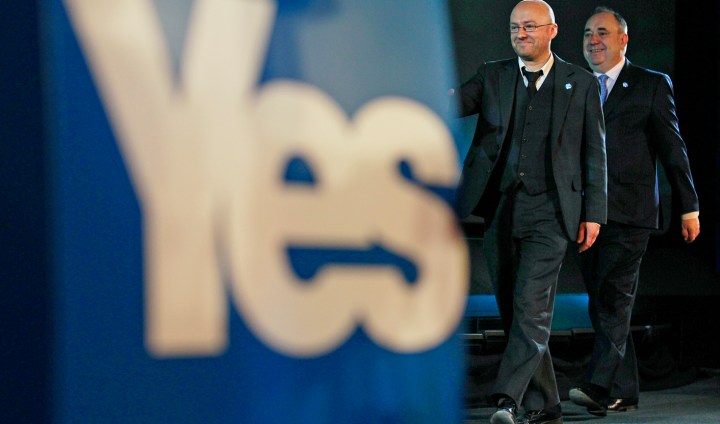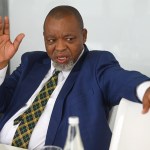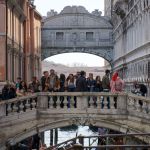Newsdeck
Scots begin push to be a nation once again

With rousing speeches, patriotic music and support from actor Sean Connery, supporters of independence for Scotland launched a campaign on Friday which they hope will lead to the demise of a 305-year-old union with England and the breakup of Britain. By Andrew Osborn
“This is the beginning of something really special – the beginning of the campaign to restore nationhood to Scotland,” Alex Salmond, leader of the Scottish National Party (SNP), told hundreds of supporters in a hall in the capital Edinburgh.
“We want a Scotland that is fairer and more prosperous.”
The campaign hopes to tap into a blend of historical rivalry, different political tastes, and a perception that the British parliament in London does not safeguard Scotland’s interests to win a referendum in 2014 which would pave the way for full independence two years later.
If successful, the drive could create serious problems for Britain, which comprises England, Scotland and Wales (Britain is in turn part of the United Kingdom which also includes Northern Ireland).
With its kilts and tartans, bagpipes and whisky, Scotland has a distinctive, if romanticised, culture. There has also been darker history of poverty, violence and ill health, notably in the largest city Glasgow, once an engine of the British Empire.
Scotland already has many of the trappings of an independent nation such as its own flag, sports teams, and a history of achievements in science and literature.
Britain’s current government, a coalition between the Conservative party and the Liberal Democrat party, is opposed to Scottish independence as is the opposition Labour party. Britain is stronger as a union, they argue, and an independent Scotland might struggle on Europe’s fringes.
The SNP’s Salmond, speaking in front of a giant screen showing a cloud-flecked blue sky, had no such doubts.
He said his aim was to get one million Scots to sign the “Yes Declaration” before the referendum.
CONNERY SUPPORT
Under a devolved system of government, the Scottish parliament created in 1999 controls health, education and prisons while the British government in London controls everything else including foreign policy and defence.
“If the parliament can run education, why can’t we run the economy? And if we can protect our old people why can’t we protect ourselves without the obscenity of nuclear weapons?” Salmond told the audience.
The launch event drew on rousing patriotic music and a film showing the country’s stunning Highland landscapes, fishermen, universities, and, inevitably, leaping kilt-clad dancers.
It also relied on celebrity endorsement. A message of support was read out from actor Sean Connery, an Edinburgh milkman before he found fame as secret agent James Bond.
Hollywood actor Brian Cox called Scotland’s current predicament “centralised servitude” and related how like many Scots, he had become disenchanted by previous Labour governments led by former prime ministers Tony Blair and Gordon Brown.
“The parliament at Westminster can see no further then the end of its own bridge,” he said.
Scotland’s national poet Liz Lochhead read out a poem focused on English-Scottish rivalry in the 16th Century.
Opinion polls show that around 40 percent of Scottish people are sympathetic to independence, with around 10 percent undecided and the remaining 50 percent opposed. South of the border in England, polls show people are largely apathetic.
Author Harry Reid said the referendum’s success may hinge on whether the Labour party, traditionally popular in Scotland, can revive its fortunes.
Scotland is more inclined to vote for the left, whereas English voters have voted in much larger numbers for the right, underscoring a political fault line between north and south.
Although the Conservative party won more votes than any other party at the last British general election in 2010 it won only one parliamentary seat in Scotland.
One joke doing the rounds since two Chinese pandas took up residence in Edinburgh Zoo notes that there are now more pandas in Scotland than Conservative MPs.
DIMINISHED ROLE?
Scotland’s preference for a more centre-left brand of politics which favours egalitarianism over the free market is reflected in education policy. In England, students have to pay large tuition fees to attend university, whereas in Scotland such education remains free for Scots.
Reid said disenchanted Labour voters who switched to the SNP in disgust at Labour’s support for U.S. foreign policy in Iraq and Afghanistan may yet return to the fold. If they do, Scotland’s dreams of independence could evaporate, he said.
“If we’re going to get a decent Labour government back in 2015 people might wonder whether they really need independence.”
Despite its relatively small population of just over five million, compared to England’s population of just over 52 million, there are also fears that a ‘yes’ vote would diminish Britain’s voice on the world stage.
“The rest of the world would be surprised and shocked that the UK was unable to hold together,” Professor John Curtice of the University of Strathclyde told Reuters in a phone interview.
Britain would find it harder to maintain its voice at international bodies such as at the U.N. Security Council as well as in European Union decision-making.
There are also questions about whether Britain would be able to keep its nuclear submarine fleet in Scotland, where it now based. And revenues from Scottish North Sea oil remain important to its coffers.
But history runs deep and, symbolically, the independence referendum will be held on the 700th anniversary of the 1314 Battle of Bannockburn when an army commanded by England’s King Edward II was defeated by a smaller force led by Robert the Bruce, a source of enduring pride for Scottish patriots.
Scotland and England have shared a monarch since 1603 and have been ruled by one single parliament in London since 1707. The SNP’s Salmond has said an independent Scotland would retain Queen Elizabeth II as its monarch. DM
Photo: Scotland’s First Minister and leader of the Scottish National Party (SNP), Alex Salmond (R) walks on stage with Scottish Green Party leader, Patrick Harvie, to launch the “Yes Scotland” campaign for an independent Scotland, in Edinburgh, Scotland May 25, 2012. Supporters of independence for Scotland launched on Friday what they say is the biggest grassroots campaign in Scottish history, a move that could result in the demise of a 305-year-old union with England and the breakup of Britain. REUTERS/David Moir




















 Become an Insider
Become an Insider